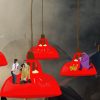Original: 【「讓陽光照入黑獄」:青山灣入境中心(CIC)前羈留人士的吶喊】, published in Grassmedia Action
Translator: Grassmedia Action
This article has been edited for precision and clarity. If you would like to be involved in our translation work, please get in touch here.
When Indonesian migrant domestic worker and journalist Yuli Riswati was deported from Hong Kong last December for reporting on the anti-extradition bill movement, supporters criticized the Immigration Department for political repression and wrongful deportation. In the solidarity assembly held shortly after Yuli’s deportation, Yuli was dialed in to share her experience of her 28-day detention in the Castle Peak Bay Immigration Center (CIC), Hong Kong’s detention center for people awaiting deportation. From her arrest to her deportation, her story made clear how inhumanely she was treated. In one instance, she was forced to strip before a male doctor for an examination, which caused her to become depressed.
Worried for the wellbeing of other detainees, Yuli wanted to raise awareness of how dire the situation was and continues to be inside the CIC. Inspired by her story, the “CIC Detainees Rights Concern Group” (otherwise known as the “CIC Concern Group”) was formed after the solidarity assembly. Working closely with organizers who support asylum seekers who experience similar treatment in the CIC, the CIC Concern group connected with many current and former detainees to support them and to listen to their stories.
With the poor living conditions of the CIC under increased public scrutiny, several lawmakers including Eddie Chu Hoi-dick, Fernando Cheung Chiu-hung, and Shiu Ka-chun as well as Labor Party chairperson Kwok Wing Kin paid an official visit to CIC in March. They were shocked by what they found. Hygiene standards were horrendous; detainees drank from a single water basket with a shared water ladle. Detainees were given no measure of privacy or respect; for instance, there was one male doctor who would conduct strip-examinations on female detainees. There was no independent complaint mechanism, meaning that detainees could only file complaints about the CIC to the CIC, with no independent body to hold the CIC accountable for its actions.
In light of these findings, the CIC Concern Group held a press conference on June 1. The CIC Concern Group invited Father Franco Mella (a.k.a Gum Jai), who had been involved in the right to abode movement, and members of the legislative council to discuss the inhumane environment inside the CIC and the detention system’s complete lack of transparency. This essay details detainees’ experiences inside the CIC.
Unexplained arrests
S came to Hong Kong in 2003 to seek political asylum after escaping the Nepalese civil war. Yet, after she was unreasonably detained twice, it became clear that Hong Kong wasn’t much safer. The first time she was detained was in 2007, when she was detained for 4 months, for which she was able to claim compensation in 2016 after winning her case against the CIC. She was then suddenly detained a second time in September 2019 during her regular check-in with the CIC. When she demanded an explanation, immigration officers forced her onto the floor, pressing their knees onto her body. She ended up being detained for three months and three weeks with no explanation to date.
Fish, a member of the CIC Concern Group, said that many detainees shared this experience of being arrested and detained without explanation. Asylum seekers are at risk of even more abusive treatment resulting from their inability to understand immigration officers’ questions.
With no recourse available to detainees and no explanation given for their confinement, detainees can be held for long periods. In one case, a former detainee was held for two years. Although the court can award damages for unlawful detention, this only applies to asylum seekers, not migrant workers in general. Of course, this fails to take into consideration that most detainees have no legal means to challenge their condition in the first place. In the rare event that a detainee is granted monetary compensation, the amount has been limited to HK$10,000 or HK$20,000. Even so, that does not make up for the physical and mental abuse suffered throughout the period of detainment.
Mental abuse
One thing that all ex-detainees bring up is the mental stress they undergo during detention. During his March visit, lawmaker Eddie Chu found that the CIC had extremely limited space for recreational activity. Besides their sleeping areas, detainees only have access to a small common area, which is already crowded with six tables and has limited free space.
Amy, another member of the CIC Concern Group, explained that unlike in prison, detainees do not have access to outdoor activity time in the CIC. This means that detainees can only stay indoors between the fourth and tenth floors, spaces designated for detainees. She shared a story of a Filipino migrant domestic worker who, after being released from the CIC, stood at a specific spot outside the building to wave to her friends in the building, because she knew that was the only vantage point from the inside.
Cramped and detained indeterminately, many detainees end up suffering from mental health problems. According to former detainees, one Pakistani man committed suicide after being detained for eight months. Some have also reported hearing screams at night.
Inhumane environment
Lawmaker Shiu Ka-chun remembered that during his visit to Stanley Prison, a foreign-born prisoner told him he would “rather stay in Stanley than [the] CIC.”
Indeed, the CIC is notoriously inhumane. S recalled that during her time there, the facility only served breakfast and dinner, detainees were given tiny cubes of soap for showers, and could not wash their clothes easily because there was never enough detergent and nowhere to hang or dry clothing.
Bringing detainees supplies from the outside is also a tightly controlled process. Last year, when CIC Concern Group member Fish brought clean clothes for Yuli, an officer told her that it was unnecessary since the facility already provided clothes. However, this is not true according to detainees, who were not provided clothing during their detainment.
To make things worse, most detainees do not have connections in Hong Kong so they do not have visitors who can bring them daily supplies in the first place. Even if a detainee is able to meet with a visitor, the items allowed into the facility are extremely limited. The brand of sanitary napkins, the color of underwear, and even the size of hairbands are all specified in an official list. Some brands on the outdated list no longer exist today.
It is also common practice in the CIC to ignore detainees’ medical needs. After an Indonesian woman broke her fingers while in the facility, the medicine she needed was not available in the CIC clinic, and detainees are not permitted to seek outside medical treatment. Unable to receive proper medical attention, she eventually lost two fingers.
Humiliation by immigration officers
In some cases, immigration officers intentionally humiliate and antagonize detainees. An Indonesian ex-detainee, NN, who despite repeatedly informing the doctor and officers about her allergy to fish, was never given fish-free meals. She once asked for ointment to relieve a serious allergic reaction but was scolded by one of the officers, “Why can’t you wait until the next day to see the doctor?” Understandably, she was furious about how the CIC immigration officers repeatedly denied her right to timely medical treatment.
The CIC has long been infamous for the way its immigration officers treat detainees. S described being treated like an “animal.” “No questions, just follow the order,” she added.
NN said the officers always brought up “the rules.” But when asked what the rules are exactly and where detainees could find them, officers never provided an answer. Officers would also humiliate detainees for their immigration status, taunting them with remarks such as: “Look at you, begging for immigration papers because you are poor.”
Labor Party Chairperson Kwok Wing-kin added that during his conversation with these officers, he got the impression that being assigned to work at the CIC is considered degrading work, which contributed to their antagonism towards detainees. Moreover, all the officers had received anti-riot training that has desensitized them to violent or forceful treatment.
Gum Jai explained that the CIC was formerly managed by the Correctional Services Department (CSD), but has been overseen by the Immigration Department since 2009. Chu suggested that the Immigration Department adopted the CSD’s managerial methods, and therefore has operated the CIC as if it were a prison. Chu added that, unchecked and unsupervised, the CIC is “a black hole within a black hole.”
Strip examinations
Despite the Immigration Department’s allegation that medical examinations are conducted by medical officers of the same sex, many former detainees have said that is not true. According to S, after she was sent to the CIC, she was immediately pulled into the washroom by a group of female officers and immediately strip searched. She was then forced to lie face down on the ground while an officer sat on her. Because she had back, waist and arm injuries, she was then sent to the clinic inside the CIC for further examination where she was asked by a female nurse and a male doctor to take off all her clothes except for her underwear.
NN’s rights were assaulted in a similar way. During her medical examination, a male doctor asked her to strip naked and turn around twice. The doctor even asked her to turn slowly so that he could more closely observe her.
When Yuli talked about her experience in the CIC, she also mentioned that after two strip searches by female officers, she—like S and NN—was asked to appear naked before a male doctor.
These experiences have led the CIC Concern Group to express concern that the male doctor in the clinic routinely uses medical examinations as an excuse to get female detainees to take off their clothes.
No way to complain: Solitary confinement
Another issue at the CIC is that complaints can get detainees put into solitary confinement. While the Immigration Department alleges that detainees can file complaints if they have grievances, Chu discovered that they had to first apply for a complaint form from CIC officers. This means that every detainee who files a complaint will get their names recorded by the CIC and risk being put into solitary confinement. During Chu’s official visit to the CIC in March, detainees were “briefed” about keeping quiet in the presence of lawmakers. Still, one detainee stood up to tell them that her experience in solitary confinement was “so miserable and it was hard to [even] stand.”
In one instance, S raised her hand to ask why she was being detained. Without being given an answer, she was then given 20 days of solitary confinement. Her cell had no windows apart from a door for officers to observe her and pass her food and other essentials. Conversation with the officers was prohibited. She was given one moldy blanket that reeked of urine. “I was not even complaining,” S professed. “I just raised my hand [to ask a simple question].”
NN was also locked away in solitary confinement when she defended an elderly Vietnamese woman who was unable to communicate with the officers. Because the Vietnamese woman had very long hair, she requested an additional hairband, for which she was scolded by an officer. NN stood up to defend the elderly woman, for which she was accused for inciting trouble. When asked to apologize, NN refused and was sent to solitary confinement for 2 days where she was not given food until she said sorry. On the third day, she was transferred to a hospital room and was told to take some medicine. NN asked what the medicine was, but the officer refused to tell her, and commanded her to drink it. When NN refused, the officer accused her of being stubborn and told her that she would remain in solitary as her dissenting attitude would only stir up more trouble. She later found out that fellow detainees went on a hunger strike for her, which prompted the end of her solitary confinement.
Calls for reform go ignored
After listening to the experiences of ex-detainees, the CIC Concern Group and several lawmakers sent a letter to the Hong Kong Immigration Department demanding an explanation for the CIC’s inhumane treatment of detainees. But these concerns were brushed aside when the Immigration Department retorted that detainees’ treatment was “just and appropriate.”
In their letter, the CIC Concern Group listed nine demands, including various improvements on CIC facilities such as air ventilation and drinking facilities, as well as a fairer complaint system. However, besides installing a new water cooler, the Immigration Department refused all the demands.
Lawmaker Shiu noted that the only reason the Immigration Department agreed to build the drinking facility was because the previous method of using a shared water ladle risked exposing detainees to the coronavirus.
Shiu raised four additional demands, which included publishing the average duration that detainees are held in the CIC; ensuring detainees have an independent ombudsman provided by the government; creating an independent complaint mechanism so that detainees do not have to fear retaliation; and, providing detailed steps on how the Immigration Department plans to put a stop to resorting to solitary confinement based on arbitrary reasons such as lodging complaints.
The CIC Concern Group further requested that the Immigration Department refrain from detaining anyone for more than half a year; upgrade detention facilities so that detainees can live in a more humane environment; and, provide the appropriate training to officers so that they can properly care for detainees. While S has no expectation that the Immigration Department can even reform the detention center given how much power they wield, she hopes to raise awareness around detainees’ confinement conditions as a way to increase public pressure and provoke change.






